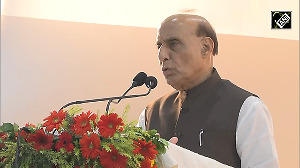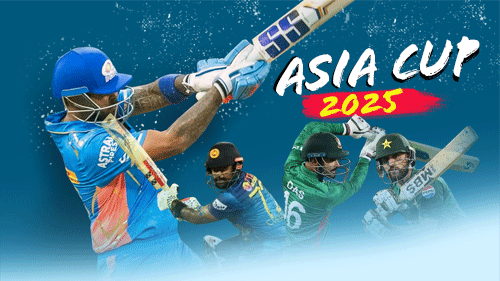Given our national/media obsession with cricket, it was no surprise that the week-long third Commonwealth Youth Games, which concluded in Pune on October 18, did not make a splash. India topped the medals table with 76, which included 33 gold, relegating established powerhouses Australia and England to the second and third rungs.
It was heart-warming to see promising Indian shooters, wrestlers and pugilists emerge from this CYG. These young hopefuls will carry the weight of expectations through to the 2020 Olympics. What depressed a sports enthusiast like self was that barring two -- swimmer Virdhawal Khade and double-trap shooter Ashir Noria -- the other champs did not look world-class, meaning one could not rest assured of them bringing an Olympic medal home.
Khade, who won three gold and three silver medals, though he looks the part, is still on the fringes, not a top-notcher yet by world standards. I have not discounted badminton prodigy Saina Nehwal; she will forever remain a strong contender.
2020: An Olympic dream
The presence of Jacques Rogge, the President of the International Olympic Committee, at the CYG gave wings to speculation that India will seriously bid for hosting the 2020 Summer Olympic Games, which will be decided in 2013.
The triple-medal showing at the Beijing Olympics has finally broken India's traditional tally of a binary number, and this has confirmed the incremental improvement in our overall sporting performance despite the tumble in hockey and football. Given our population and talent, we are still punching far below our weight, and the current tempo needs to gather momentum. What can India do to elevate her performance at the highest level -- the Olympics?
Where we stand
If we analyse the method followed by successful sporting nations, broadly three models emerge. First, the US one of utilising its schools and universities to groom sportspersons, especially its world-beating swimmers and athletes. Second, the European grid of private sports clubs/corporations as springboard to the national squads. Third, the state itself -- like the former Warsaw Pact countries, China and Cuba -- running stables to mass-produce sportsmen and women.
A fourth model has emerged recently, noticed especially during the Doha Asiad of 2006. Many Middle Eastern countries granted citizenship to foreign stars and then basked in the fruits of their labour.
There is then the Indian model. In spite of adverse circumstances, unaided, spurned and booted about by the system, the sportsman toils, wins an occasional medal against unfavourable odds, and then the whole country, more so the officialdom, appropriates the glory!
With rapid urbanisation shrinking playgrounds, and the state of schools and universities being what it is, the US model is beyond us right now. The Indian army's ambitious Mission Olympics -- to win medals at Beijing -- misfired, thus casting doubts on the efficacy of "conveyor belt" production, patented by the erstwhile USSR, in India. The European model seems replicable but it calls for taking the corporate-kings on board, and it counts on the riches, and the media-generated name and fame, luring both youngsters and moneybags to take to sports.
The Special Area Games Programme of the Sports Authority of India was launched to unearth talent and convert it into sporting excellence. It brought forth a talent like Limba Ram, an archer worth his weight in gold, but feckless SAI officials botched and unmade a world champion. There is no dearth of natural talent, if only there was a system to prospect for them and then nurture them to realise their potential.
The present system stinks
Fazil Ahmed reigned as president of the Badminton Association of India from 1985 to 1998, and thus invited the inglorious, apt epithet 'Fossil'. Our sports administrators -- ageless politicians, bureaucrats and similar self-seekers -- are an embodiment of the fossil metaphor. Though patronage continues to flourish, sports administration has died many deaths.
Having tasted blood, big daddies of sports, like Suresh Kalmadi, know that big money comes from organising extravaganzas like Commonwealth Games, Asian Games and Olympics. Now it is futile to expect them to dirty their hands in developing the grassroots sporting-infrastructure.
Who can set it right?
Since governmental largesse is its lifeline, the sports ministry can do that by goading the lazy sports bodies to professionalize their set-ups. No minister, alas, has shown the inclination to crack the whip and reform sports administration. Despair.
Despair not, two illuminating examples
With 47 medals, Great Britain finished fourth in the Beijing Olympics. Though gigabytes of eulogy have been showered on the turnaround already, it is still worth our while to recall the pith here as it has an instructive lesson for India.
Unable to allocate budget for sports, then Prime Minister John Major carved a chunk out of profits from National Lottery to fund the sports governing body UK Sport, which fathered the World Class Performance Programme. For athletes on WCPP, UK Sport funds their parent governing body to provide a range of support services to make them competitive on the world stage.
Each sport's Performance Programme is overseen by a Performance Director, who coordinates all the back-up that athletes require to deliver on their potential. This kind of support is typically worth around £85,000 per athlete per annum. UK Sport invested £75 million for the 2008 Olympics. The sports bodies unable to deliver have to account for its poor showing.
Result: Innovative planning and funding, rigorous accountability ensured sumptuous returns at Beijing. Britain harvested 19 gold medals at Beijing, a far cry from the lone one at Atlanta (1996). She dominated cycling and sailing, won gold medals in swimming, athletics, kayak, rowing and boxing, and the likes of Chris Hoy, Victoria Pendleton, Sarah Ayton, Rebecca Adlington, Nicole Cook and James DeGale became household names.
Here is another instance of planning, determination and execution. Two decades ago, China, no great shakes in tennis, could barely count 20 tennis courts in the whole country. But that did not dissuade the system from dreaming. By dint of hard work, in 2004 at Athens, the Chinese women's pair of Li Ting and Sun Tiantian won the gold medal in women's doubles tennis.
I know India is not a patch on China or Great Britain as regards sports administration, yet I cited the above shining examples to emphasise what a strong national will can achieve. Planning and accountability, regrettably, are anathema to Indian sports federations.
The long and the short of it
If we want to excel, it is a no-brainer that we have to enhance our performance exponentially. To effectuate that, we need both long-term and short-term strategies. We are no great sporting nation, and therefore the long-term project must hinge on inculcating a 'sports culture'. Further, we have to devise a system that will make professional sports attractive, and rewarding enough to wean the youth away from established professions. This will entail taking sports to schools and colleges, advancing sports medicine/psychology and building first-rate facilities.
In the short run, we must set our sights on the London Olympics in 2012. We will be stupid if we do not take advantage of the resources in the US, Europe and East Asia through sponsorship and tie-up, to train our sportsmen. The sports minister M S Gill has said he would earmark Rs 700 crore to prepare sportspersons for the 2010 Delhi Commonwealth Games. He should envision the larger picture of the London Olympics and dovetail his Delhi Games' script into the Olympics programme.
The London Olympics offers 300 gold medals in 26 disciplines, and the disciplines offering maximum gold medals are: Athletics (47), Aquatics (46), Wrestling, Cycling & Gymnastics (18 each), Canoe and Kayak (16), Weightlifting & Shooting (15 apiece), Rowing & Judo (14 apiece), Boxing & Sailing (11 each). Besides minding aces like Khade and Nehwal, we must dedicate our energies on disciplines like shooting, wrestling, weightlifting, judo, boxing, even rowing. Focussing on a team game like hockey will fetch just one medal, but pushing the above sports with the same resources may land us a glut.
Expecting our present moth-eaten system to deliver is like hoping for an atheist to embrace the holy book. Then who can deliver? I don't know. Possibly a few standout people, without the overweening sports-bureaucracy breathing down their neck, might be able to swing it.
Why not entrust the task of planning and executing our Mission London to a team comprising Prakash Padukone, P T Usha, Geet Sethi, Dhanraj Pillay and Jaspal Rana?
Lastly, politics and Olympics go hand in hand
China's chartbusting feat in the stadiums has lent extra lustre to its political profile. Be it Berlin, Tokyo, Munich, Seoul or lately Beijing, organising the Olympics has commonly been an overt political statement; it heralded the arrival of a new power. There is as much politics as sport in Olympics!
Should the Olympics come our way in 2020, it will double as our coming-of-age party. Barring Mexico (1968), Canada (1976) and Greece (2004), every host country of the summer Games in the past 15 Olympiads has finished in the top ten. So a paltry medal haul can become a party-pooper. As they say in racing, it is neck or nothing. Let us start preparing in real earnest.
M P Anil Kumar is a former Air Force pilot and a sports buff.






